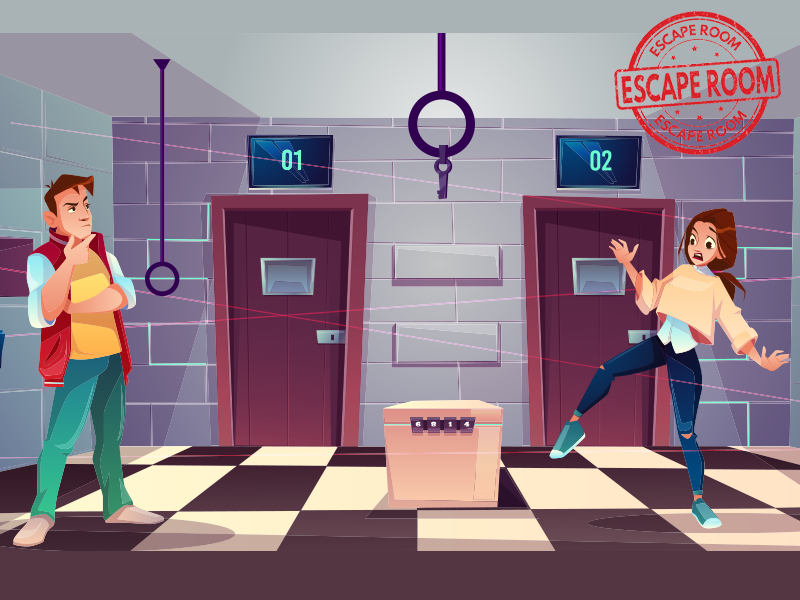Video games are a fun way to spend time. They let us enter different worlds, be heroes, and go on adventures. One of the coolest parts of video games is the characters we meet along the way. These characters, who are not controlled by players, are called Non-Player Characters or NPCs. NPCs can be shopkeepers, enemies, friends, or even animals in the game.
But have you ever wondered how NPCs know what to do? This is where something called Artificial Intelligence, or AI, comes in. AI is like a super-smart brain for computers. It helps NPCs act in a smart and believable way, making the game more exciting. In this article, we will explore how AI is making NPCs smarter and more interesting.
Evolution of NPCs in Video Games
When video games first started, NPCs were very simple. They could only do a few things like move in one direction or say the same thing over and over. Early games like “Pac-Man” had ghosts that chased you in a predictable pattern. These NPCs were fun, but not very smart.
As technology improved, so did NPCs. Game developers started using more advanced techniques to make NPCs act more like real people or creatures. One big step was when NPCs could follow simple rules. For example, in the game “The Legend of Zelda,” enemies would move toward you when they saw you. This made the game more challenging and fun.

Over time, NPCs became even more advanced. They started using something called AI, which allowed them to make decisions based on what was happening in the game. This made NPCs feel more lifelike and unpredictable. For example, in the game “Super Mario 64,” the enemies could move around obstacles to get to Mario. This made the game more exciting because you never knew what the enemies would do next.
Today, NPCs are smarter than ever. They can have complex behaviors, learn from players, and even show emotions. This makes games more immersive and enjoyable.
AI Techniques Used in NPC Development
There are several ways that game developers use AI to make NPCs smarter. Let’s look at some of the main techniques.
Rule-based Systems
A rule-based system is like giving the NPC a set of instructions to follow. For example, if an NPC is a shopkeeper, the rules might be: if a player comes into the shop, greet them; if they want to buy something, sell it to them. This makes NPCs act in a predictable way, but it can be limiting because they can’t do anything outside of the rules.
Finite State Machines (FSM)
Finite State Machines are a bit more advanced. Imagine a state machine as a flowchart where NPCs can be in different states, like walking, running, or attacking. Depending on what happens in the game, the NPC can switch from one state to another. For example, if an enemy sees you, it might switch from walking to attacking. This makes NPCs more flexible than simple rule-based systems.
Behavior Trees
Behavior trees are like a map of all the actions an NPC can take. The tree starts with a big task, like “survive,” and breaks it down into smaller tasks, like “find food” or “avoid danger.” This helps NPCs decide what to do based on what’s most important at the moment. Behavior trees are very powerful and are used in many modern games to create complex and believable NPCs.
Machine Learning
Machine learning is the most advanced technique. It allows NPCs to learn from their experiences. Just like how you learn from your mistakes, NPCs can use machine learning to get better at tasks over time. For example, an NPC might learn the best way to avoid a player’s attacks by remembering what worked before. This makes NPCs very adaptable and intelligent.
Each of these techniques helps make NPCs smarter in different ways. By combining these techniques, game developers can create NPCs that feel almost like real characters.
Enhancements in NPC Behavior through AI
AI has made NPCs much smarter and more interesting. Let’s look at some of the ways AI has improved NPC behavior.
Realism and Immersion
One of the biggest improvements is in realism. NPCs can now act in ways that make the game world feel real. For example, in games like “The Sims,” NPCs have daily routines. They eat breakfast, go to work, and sleep at night, just like real people. This makes the game world feel alive and immersive.
NPCs can also react to what players do. If you help an NPC in a game, they might thank you or even help you later on. This makes players feel like their actions matter and makes the game more engaging.
Adaptability and Learning
Another cool improvement is that NPCs can now adapt to what players do. In some games, NPCs can learn from the player’s actions and change their behavior. For example, if you always use the same attack in a fighting game, the enemy might learn to block it. This keeps the game challenging because you have to keep thinking of new strategies.
In some games, NPCs can also adjust the difficulty based on how well you’re playing. If the game notices you’re having a hard time, it might make enemies a bit easier. But if you’re doing really well, it might make the game harder. This makes sure the game is always fun and challenging.
Social and Emotional Intelligence
AI has also allowed NPCs to show emotions and social behaviors. In games like “Red Dead Redemption 2,” NPCs can get angry, sad, or happy based on what happens. They can also form relationships with the player and other NPCs. For example, if you’re nice to an NPC, they might become your friend. But if you’re mean, they might become your enemy. This makes the game’s story more interesting and personal.
Overall, AI has made NPCs much smarter and more engaging. They can now act in realistic ways, adapt to the player’s actions, and even show emotions. This makes video games more fun and immersive than ever before.
Case Studies and Examples
Let’s look at some specific games that use AI to create smart NPCs.
Example 1: “The Elder Scrolls V: Skyrim”
In “Skyrim,” NPCs have something called Radiant AI. This system allows NPCs to have daily routines. They go to work, eat meals, and sleep at night. NPCs can also react to the player’s actions. If you help an NPC, they might give you a reward or help you later on. This makes the game world feel alive and interactive.
Example 2: “Red Dead Redemption 2”
“Red Dead Redemption 2” is known for its realistic and detailed NPCs. Each NPC has a schedule and can interact with the player in different ways. If you’re friendly to an NPC, they might greet you warmly. But if you’re rude, they might avoid you or even start a fight. The game also has a system where NPCs can remember your actions and treat you differently based on how you’ve behaved in the past. This makes the game world feel dynamic and responsive.
Example 3: “Left 4 Dead”
“Left 4 Dead” uses something called the AI Director to make the game more exciting. The AI Director can change the game’s environment and spawn enemies based on how well the players are doing. If the players are having an easy time, the AI Director might spawn more enemies or create more obstacles. But if the players are struggling, it might make things a bit easier. This keeps the game balanced and fun, no matter how many times you play it.
These examples show how AI can be used to create smart and engaging NPCs. By using advanced techniques, game developers can create NPCs that feel like real characters, making the game world more immersive and enjoyable.
Challenges and Limitations
Even though AI has made NPCs much smarter, there are still some challenges and limitations.
Technical Challenges
One of the biggest challenges is the technical side of things. Making smart NPCs requires a lot of computing power. This means that the game needs a strong computer or console to run smoothly. If the game has too many smart NPCs, it can slow down or even crash. Game developers have to find a balance between making NPCs smart and keeping the game running well.
Another technical challenge is making sure that NPCs don’t get too predictable. If NPCs always act the same way, the game can become boring. Developers need to create NPCs that can surprise players and keep the game interesting.
Ethical Considerations
There are also ethical challenges. One concern is how AI makes decisions in games. For example, if an NPC has to choose between helping one player or another, how should it decide? Game developers need to make sure that AI decisions are fair and don’t upset players.
Another ethical issue is about the behavior of NPCs. If an NPC behaves in a way that is offensive or harmful, it can create problems. Developers need to make sure that NPCs act in a way that is appropriate and respectful.
Despite these challenges, AI continues to improve and make NPCs smarter. Developers are always finding new ways to overcome these issues and create better NPCs.
Future Trends in AI for NPCs
The future of AI in game design is very exciting. Here are some trends we might see in the coming years.
Predictions for Next-Gen NPCs
In the future, NPCs might become even more lifelike. With advancements in AI, NPCs could have even more complex behaviors and emotions. They might be able to hold conversations with players, remember past interactions, and change their behavior based on long-term relationships. This would make games even more immersive and engaging.

Potential Impact of Emerging AI Technologies
New AI technologies like deep learning and neural networks could make NPCs even smarter. These technologies allow computers to learn and make decisions in ways that are similar to how the human brain works. This means that NPCs could become better at understanding and reacting to the player’s actions.
Cross-Disciplinary Influences
AI in games is also influenced by other fields like psychology and robotics. For example, understanding human behavior can help developers create more realistic NPCs. Robotics can also provide insights into how to create NPCs that can interact with the physical world. By combining knowledge from different fields, game developers can create NPCs that are more advanced and believable.
Overall, the future of AI in game design looks very promising. We can expect NPCs to become even smarter and more lifelike, making games more fun and immersive.
What is Next?
AI has revolutionized the way NPCs are designed in video games. From simple characters that follow basic rules to complex beings that can adapt and learn, AI has made NPCs smarter and more engaging. Today, NPCs can act in realistic ways, show emotions, and even remember past interactions with players. This makes games more immersive and enjoyable.
As technology continues to advance, we can expect NPCs to become even more lifelike. The future of AI in game design is full of possibilities, and we can look forward to even more exciting and interactive gaming experiences.









